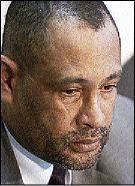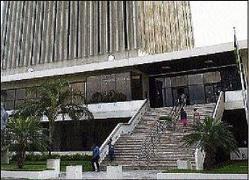Keith Collister, Business Writer

Derick Latibeaudiere Governor of the Bank of Jamaica. - Rudolph Brown/Chief Photographer
Bank of Jamaica (BoJ) Governor, Derek Lati-beaudiere, addressing the issue of the Jamaica Labour Party's (JLP) proposal for an independent central bank, argued that this call was nothing new. He said he has been at his current job for 12 years and has had to address the issue every year.
He explained tha "all central banks want to be autonomous" he had "never suffered from the problem of the Government dictating to this central bank." He noted that, apparently, like Jamaica, in his view, some "Central Banks overseas were not legislatively, but practically autonomous".
Addressing the current financial situation, he noted that the Government was keeping the fiscal situation tight and that any current financial pressures were coming from the international community and were "not local problems".
In response to a question as to whether the sub-prime mortgage debt crisis (and potential associated credit crunch) currently occurring in the U.S. would affect Jamaica, the governor noted that while the fall in prices of Jamaica's international bonds was "not major", international "trends were not positive at this time."
Responding specifically to a question on whether Jamaica currently had capital-market access, he said that it was not so much a question of access, but what price Jamaica was willing to pay for international capital. Sometimes, he said, it was simply not desirable to borrow at the rate being offered.
He added that in his view, Jamaican bonds were not "junk", as Jamaica should be regarded as "separate and apart from other emerging markets" and that he would not "put Jamaica in the same category as other emerging markets" due to our strong track record of debt repayment and continued willingness to pay.
While clearly acknowledging the pressures coming from the international capital market overseas, the governor said that the Bank of Jamaica had "no knowledge at this time" of margin calls from foreign banks lending money to Jamaican institutions against Jamaican bonds affecting our local foreign-exchange market. Such a margin call would occur through a demand for additional cash by a foreign bank from a local institution, which coul local demand for foreign currency as the local institution purchased U.S. dollars for wire transfer abroad, putting additional pressure on the exchange rate.
Foreign-Exchange market

The Bank of Jamaica. - File
The governor described the foreign-exchange market as experiencing intermittent bouts of instability, particularly in June. He sees a risk to the Bank of Jamaica's relatively benign inflation outlook of six to seven per cent from the domestic currency market, which has been experiencing some pressures "as a result of reductions in foreign-currency inflows and increased Jamaican-dollar liquidity."
The pressures on the foreign-exchange market were mainly due to a fall in net private-capital inflows, largely reflecting portfolio switching by investors in the context of a narrowing in the interest-rate differential between Jamaica dollar and U.S. dollar-denominated bonds. "External financing activities by a public sector company in June," probably a reference to Air Jamaica, "as well as increased demand by selected private sector entities to facilitate dividend payments, also acted as triggers for increased instability in the market over the quarter," said Latibeaudiere.
According to the central bank, for the September 2007 quarter, the bank expects "that periodic gaps will emerge in the foreign exchange market" with "continued reversals in interest-rate spreads on emerging market bonds and an increased hawkishness on the part of some of the central banks of the advanced economies."
Moreover, they add that "domestic liquidity conditions can facilitate speculative forces, even as the central government moves t its debt strategy with best practices.
Inflation
The governor noted inflation for the June 2007 quarter was 1.9 per cent, bringing the annual measure of inflation to 5.6 per cent, the lowest since November 2006. The governor argued that core inflation remained contained at around one per cent per quarter, and that due to the central bank's conservative forecasting of food and energy prices, e.g., that they would be relatively high, the governments projection of six to seven per cent inflation, or around three per cent of "excess inflation" above their estimate of core inflation of around four per cent for the full year (excluding food and energy) remains on track.

